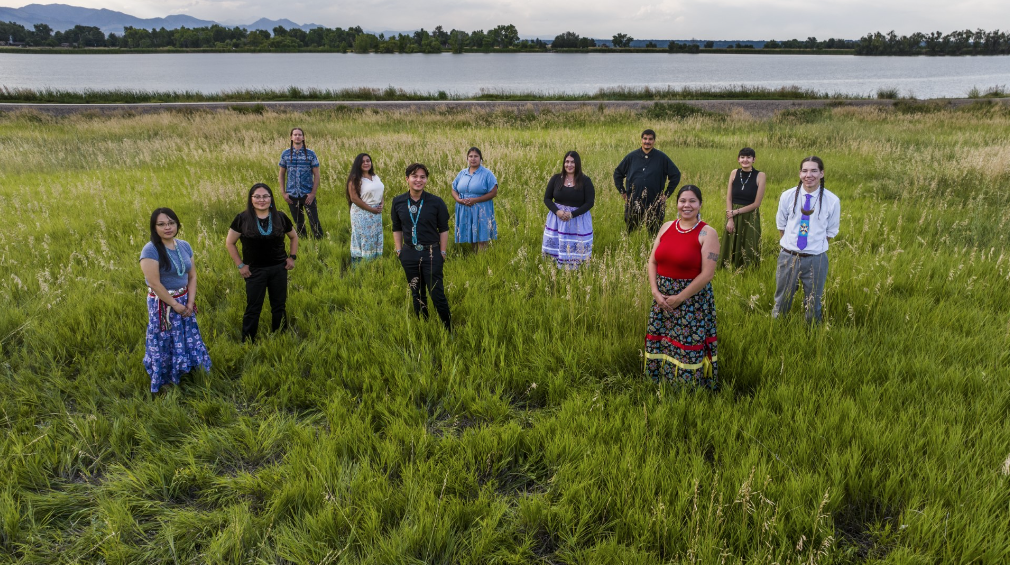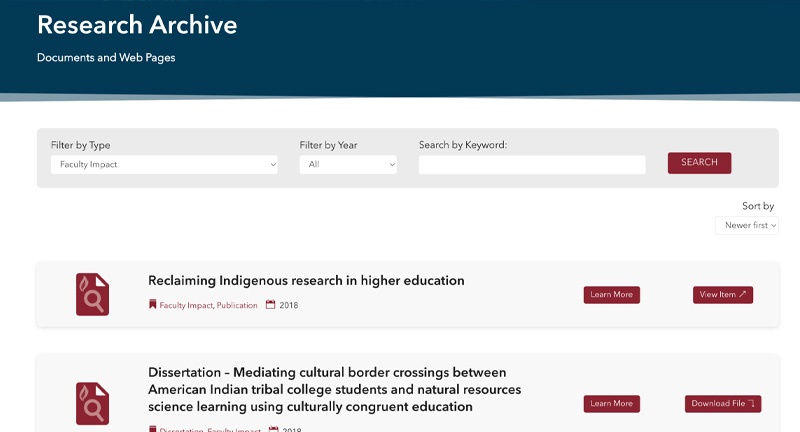Representatives of the American Indian College Fund (the Fund) attended the Department of Education’s (DOE) Listen and Learn session in Denver, Colorado. All federal agencies were charged with developing an action plan and with fulfilling trust responsibilities to Native nations by connecting with tribes, according to Charlie Rose, DOE general counsel. As part of that, Rose cited a need to preserve Native language and culture, a mandate that the DOE work more closely with the Department of the Interior, and a need to elevate the position of Indian education within the DOE.
Rumors have been circulating in Indian Country that the Department does not support the passage of a separate Executive Order on Tribal Colleges and Universities by President Obama as his predecessors, President Clinton and President George W. Bush did, but rather, the president has already drafted and will sign an “omnibus Indian Education Executive Order.” This would even include mainstream institutions of higher education, such as any state college or university that an American Indian/Alaska Native might attend. If this is true, then one can only question whether due process is being served by holding consultation sessions with the public after the fact.
Aligned with the American Indian Higher Education Consortium, the Fund attended the session to urge that President Obama reaffirm his commitment to tribal sovereignty and self-determination while addressing the TCUs’ challenges in equitably participating in federal programs by passing a separate Executive Order.
American Indian and Alaska Native tribal governments have chartered 33 TCUs and the Federal government has established or chartered three institutions of higher education to ensure that high quality, culturally-based higher education is accessible to American Indian people who were largely excluded from state-supported higher education programs. These institutions operate on 76 campuses in 15 states within the geographic boundaries where the majority of American Indian reservations and federal Indian trust land lie, while serving more than 250 federally recognized Indian tribal nations. Tribal colleges have been called “underfunded miracles.” In addition to providing accredited postsecondary education and technical education to Native communities, they have served as the bedrock of these communities by providing services to people of all ages, including economic and workforce development programs; community-based support services, programs, and collaborative partnerships with the tribes, K-12 education systems and schools, and other stakeholders; and agriculture and land management programs and services. Tribal colleges also often provide Native communities their only library, health center, and recreation center. Last year the TCUS served 61,000 people. With the many roles these institutions serve, they have been compared to the hub of a wheel.
A separate Executive Order is necessary for many reasons. First, American Indians have a legal relationship with the government as sovereign nations as a result of our treaty agreements. Under these agreements, the government agreed to provide for basic needs, including education, in exchange for millions of acres of land that was ceded. Although American Indians are comprised of different racial and ethnic groups, their legal relationship sets them apart from Hispanic, African American, or Asian and Pacific Islanders, and as such, necessitates a separate Executive Order.
And because TCUs were established by sovereign nations, they do not received tax revenues from the states in which their reservations reside. As a result, federal, tribal, and private support is their only financial support. Yet the omnibus executive order would pit state institutions serving American Indians against the TCUs in competition for funding. State institutions enjoy significant funding advantages over the TCUs because they receive both state and federal revenues, yet are held to lower standards to prove Indian enrollment numbers (many state institutions have to show only a 10% Indian enrollment to receive federal funding, while TCUs must show 51% Indian enrollment).
This seems patently unfair. The TCUs are already at a funding disadvantage, and an omnibus executive order would have a crippling effect with regard to their financial sustainability. Many TCUs already remain unable to fully participate in the nation’s higher education and research programs, are often excluded from new federal education initiatives, and all of the TCUs are notoriously underfunded compared to other higher education institutions—even other Minority Serving Institutions. The TCUs receive about $5,500 per Indian student for operational funding from the federal government, while other Minority Serving Institutions which receive operational funding from the Federal government get more than $19,000 per student annually.
William Mendoza, Sicangu Lakota, acting director, White House Initiative on Tribal Colleges and Universities, said it has yet to be determined how tribal colleges impact the broader American Indian community. Yet many of the people sitting on that panel that day were graduates of tribal colleges. Many of the educators in the audience had attended a tribal college. Many of our tribal leaders attended a tribal college. Several of our employees here at the American Indian College Fund are graduates from tribal colleges.
The fact is, for many people in our communities, a tribal college is the only option for their education, as they cannot afford to leave the reservation, and logistically cannot leave due to family and community demands. Without a separate executive order for tribal colleges, the dream of equity in education will be dead for Native peoples.
Additional comment sessions with the Department are planned in April and May in Green Bay, Wisconsin and Stockton and Los Angeles, California, and will be held in other locations as well. I would like to urge everyone in our communities to make their voices heard and speak up for the separate funding of TCUs under a separate Executive Order, as well as for the important and sacred work that these “underfunded miracles” are doing.
Let’s hope these officials give the Native community due process and are actually listening, rather than just paying us lip service. It is my hope that we can drop the word “underfunded” from that description and that American Indians will get the funding and quality of higher education that they deserve.









